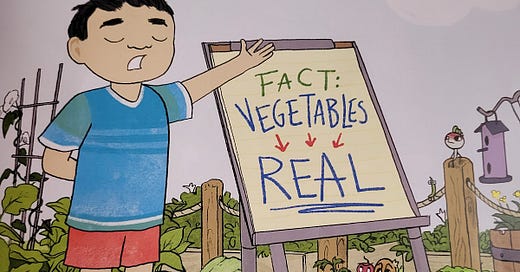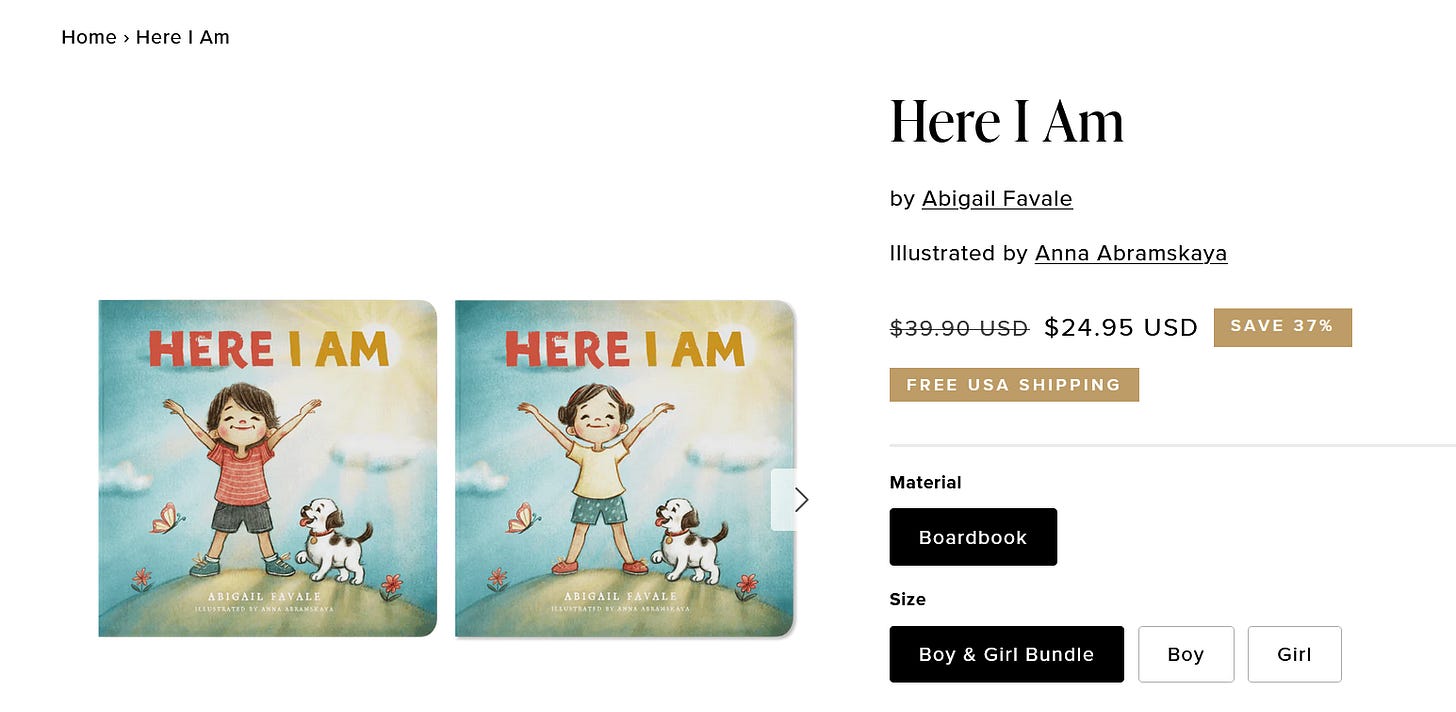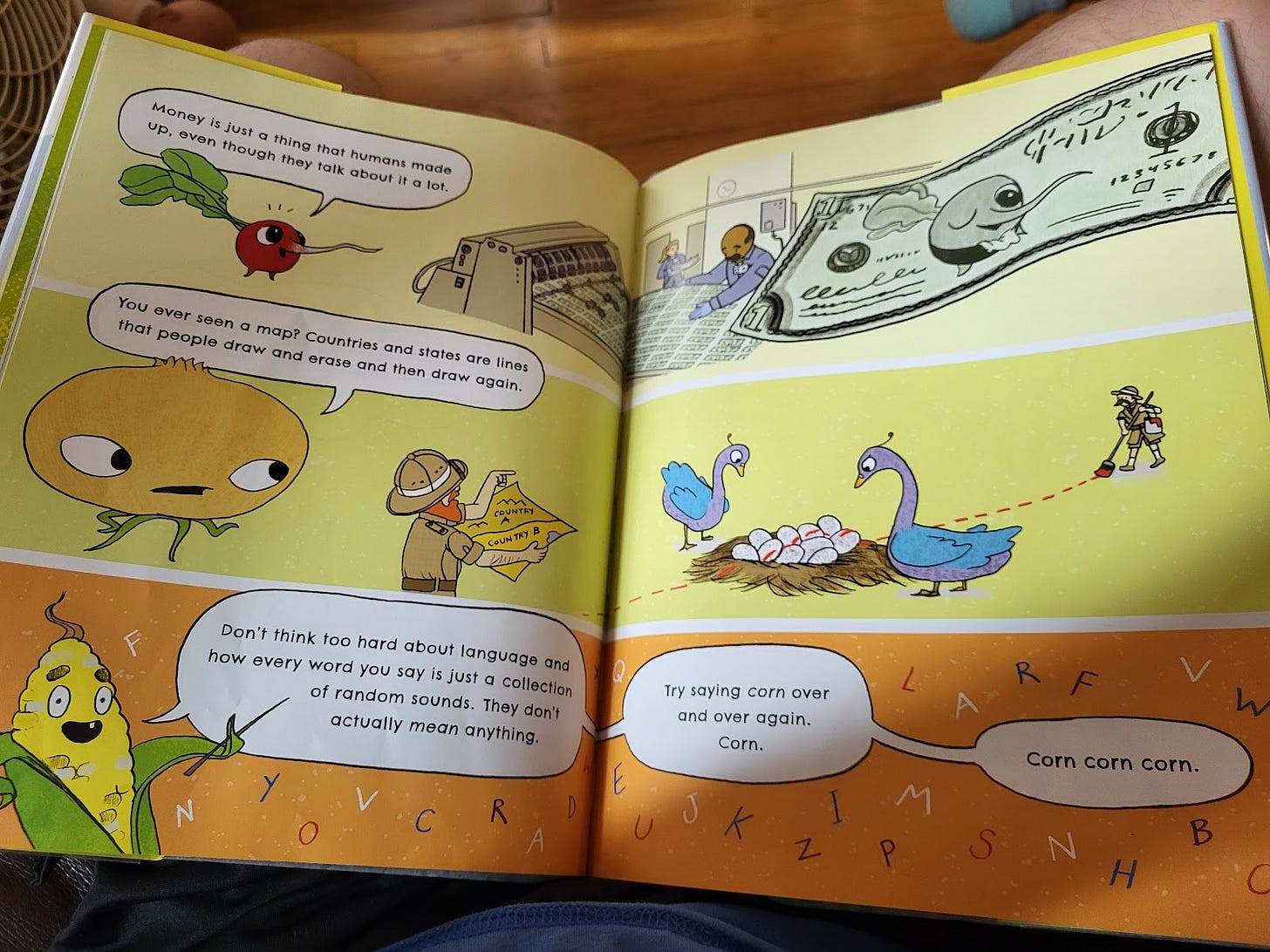“Nothing will produce Bad History more directly nor brutally, than drawing a Line, in particular a Right Line, the very Shape of Contempt, through the midst of a People,— to create thus a Distinction betwixt ’em,— ’tis the first stroke.— All else will follow as if predestin’d, unto War and Devastation.”
-from Mason & Dixon by Thomas Pynchon
“I'll be reborn someday, someday/
If I wait long enough/
I don't have to be afraid/
I don't wanna be afraid/
And you can't tell me what my spirit tells me isn't true/
Can you?”
-The Mountain Goats
I regret to inform you that Word On Fire is getting into the trans panic children’s book business. It’s an abject embarrassment for the Catholic church, but I’m not sure if Robert Barron has ever put his name on anything that wasn’t an abject embarrassment for the Catholic church.
Here I Am, written by Notre Dame professor Abigail Favale, illustrated by Anna Abramskaya, and presumably drafted with the title “SHUT UP YOU’RE A [BOY/GIRL]”, is about being grateful for the gift that God gives each of us with our body. I think it’s about that, unless the first bulleted reason for publishing the book is that it’s just a salvo in stupid culture war bullshit:
“This book helps parents to:
-Combat confusing gender ideology.
-Lay a foundation for theology of the body for young children.
-Offer a positive and sacred view of the body.
-Explain that gender is rooted in the body, not in feelings, perceptions, or stereotypes.
-Help children understand his or her body as a good gift from God, not something to war against.…Human personhood is expressed in two distinct modes: male and female. Having two separate versions for boys and girls shows, not just tells that being a boy or a girl is fundamentally about the body.”
I had first heard about WOF’s exciting new business venture through this NCR piece by Stephen McNulty, who compares the book’s message, correctly, to the message of conversion therapy, a practice proven to be harmful to the health of trans individuals, that bishops readily embrace:
“Setting aside the palpable irony here — that those who complain the loudest about "pushing gender ideology onto children" are now pushing their own gender ideology onto children — what are the use cases for such a book? One such case goes as follows: A child tells their parents that they're not sure about their gender identity yet, that they want to explore different presentations, or that maybe they want to try a new set of pronouns. The parents, in return, show their child this book, which insists on a trans-exclusionary worldview, where this type of exploration is both logically and morally impossible…the goal is simple — convince a trans child to embrace a cisgender identity. To "convert" them, we might say.”
Now, it doesn’t appear that the book contains more than 40 words, so it’s not like a heavy ideological bludgeon aimed at children, but based on the book’s description the author is clearly writing it as a refusal to acknowledge not just gender dysphoria, but any experience or presentation of gender that cannot be expressed with restroom signage. There are two versions of the book, one for boys and one for girls, because the message of this project is that there are two ways to exist: fully feminine, and fully masculine, with a big bright un-straddle-able line drawn between the two. Being a boy or girl is fundamentally about the body, and social norms and interactions and choices have nothing to do with gender expression, which cannot transgress the shape of your genitals. If I wanted to find a list of counterexamples that all came from the same period in Christianity, surely it would take me longer than 15 seconds, right?
“As long as gender has existed, gender transgressors have existed…[Medieval Christians] loved the idea that a woman could be liberated from her father by becoming like a man. They also loved Joan of Arc, who wore men’s clothing, and they loved Saint Euphrosyne, who transformed herself into a monk named Smaragdus and lived for thirty-eight years in the monastery as a man, never discovered until they died. They loved Saint Hildegonde, who became a Trappist named “Brother Joseph,” and they loved Saint Francis’s friend Jacoba, whom Francis called “Brother” as well. In the Orthodox church they venerate Anastasia the Patrician, who lived as a desert hermit for decades in the 500s BCE, in a time when only men were allowed to be hermits, and they loved dozens and dozens of other gender-transgressing saints and holy people.”
That's from the very good 2021 book The Defiant Middle by the very good author Kaya Oakes, who is a woman, although as she points out in the same chapter of that book, “it would be relatively easy for someone to decide that since I no longer have a uterus or functioning ovaries, I don’t make enough estrogen to be a woman, and as I don’t take estrogen supplements, that same someone may decide my chemical makeup is neither male nor female but a kind of undulating genetic slush.” Weirdly, I know that Kaya Oakes is a woman not because I've personally reviewed her estrogen levels, but because I can recognize social cues and pay attention to how she presents and talks about herself, just like all of us do, all of the time, whenever we encounter somebody outside the context of a blood test, because gender very obviously has a social component. I’m not sure what Abigail Favale does when she meets a new person; does she ask to inspect their genitals before deciding to interact with them as a man or woman? That would align with the bonkers line from Dignitas Infinita that “all attempts to obscure reference to the interminable sexual difference between man and woman are to be rejected,” and makes me worried that if I were ever to meet Professor Favale, she’d1 upbraid me for shaving my face and covering my dick with pants. What would Favale say about the women that Oakes listed above, who were biologically women but obviously did not conform to the social presentation of women in their era, who certainly obscured references to their sexual differences? Maybe they were all just stupid bitches who should have known better? Is it possible they were on their periods or something?
There are at least three reasons why the church - bishops, and writers that the bishops choose to promote, and the DDF while we're at it - needs to stop saying shit like this. The first one is obvious and immediate: this hurts and even kills people. McNulty references some of these numbers in his piece, but: youth experiencing gender dysphoria who do not live in a supportive home environment - say, for example, they live with conservative Catholic parents who refuse to acknowledge that something like gender dysphoria is even real, because somebody like Robert Barron keeps telling them that - are at a far higher risk of suicide and homelessness than other members of their age group. Favale and Barron have a shot at getting those numbers even higher, but I'm assuming (hoping) that this is not the reason why they are working hard to get Here I Am into parents’ hands.
The second reason that the church needs to stop doing this is that this hurts the church, literally hurts the body of Christ, literally keeps the church from accomplishing its mission. The church tells trans people - and queer people of all kinds - that they are not welcome in our schools, not welcome to receive the sacraments, not fit to work for the church, not allowed to lead in any way, somehow deluded about who they are. To borrow a line from Natalia Imperatori-Lee: the church is hopelessly handicapped, less than what it needs to be, because of who it excludes from leadership. We are failing to witness to the fullness of the reality of God. Our church cannot exist effectively in the world while simultaneously dismissing even the existence of one of the world's most marginalized groups. What has the church gained from this dismissal? Transactional alliances with reactionary politicians? A shrinking and dying clerical class that still appears to be largely made up of sexual predators? A moral leadership position on the world stage that nobody has any reason to take seriously? Is being this much of an asshole really worth so much upside?
The third reason is also really important and, I feel, under-discussed: the church needs to show that they understand what a social construct is. Because they've gotten it wrong before in ways that were very bad. Racial differences used to be “rooted in the body, not in feelings, perceptions, or stereotypes” too, and that’s why the church was so comfortable being a major institutional slaveholder or openly supporting segregation or shackling indigenous people, and now the church has to tell us “ah crap we got that one really wrong”. The “perfidy” of the Jewish people was so self-evident that calling it out was part of the Good Friday liturgy, and now the church has to tell us “ah crap we got that one really wrong”. They treated social constructs, differences and groupings made up by society, as divinely ordained. They drew their bright lines and allied themselves with some of the worst oppressors in world history. So when they tell me that the social construct of gender is also divinely ordained, I’m allowed to think that they’re getting this one really wrong, too.
Some of the best Catholic writing on this topic came a little over three years ago, in a Commonweal piece by Daniel Walden titled “Sex, Gender, and Other Nonsense.” If I could paste in the text of the full essay, I would, and you should just read the whole thing yourself. As Walden writes, the social aspects of gender are sacred, too, are given to us by God just as much as our bodies are:
“When we narrate our lives, we can speak directly and cogently about ourselves. But we do something more than that, for in disclosing ourselves we also disclose the work of God. Bearers that we are of the divine image, in these acts of narration we teach other people how to gloss that image, how to read and understand the icon that stands before them. To tell other people what our lives mean is to draw them deeper into ourselves, and to listen to what someone tells us their life means is to be drawn deeper into the mystery of both their humanity and humanity’s maker. To impose upon another the meaning of their life is, by contrast, a kind of pretense at divinity. It is to tell another person something that only God can tell them, to claim the ultimate interpretive authority over experiences that do not belong to us. In a final sense, it is to do violence to someone else’s humanity…what a person tells us when they take over and correct the story of their gender is terribly important. When a person identifies as transgender, they are saying that the relationships our society has allowed them to form are not adequate, that there must be more authentically human ways for them to live. They are saying that the language used about them up to this point, the personal language that in English is highly gendered and is even more so in many other languages, has felt like a lie, one that can no longer be borne because of how much of their life it distorts or obscures. They feel that there must be other, truer ways of speaking about their life.”
It’s a beautiful piece, and again, you should read the whole thing (Walden also threw some heat at Dignitas Infinita earlier this year). That the social aspects of our lives are obvious, that they carry the potential of participation in the divine, and that the church has gotten them wrong so many times in the past, is what makes Favale’s work especially infuriating for me. Obviously, her project is ideological, but that could be said of a lot of books, including ones I actually like. Her views are incoherent trash, but in the same way that all church teaching on this topic is incoherent trash. But still: who the fuck is she? Who the fuck is she, who are any of us, to dismiss the social constructs of gender, something so obvious, so beautifully varied that it seems like God must love hownunique it is to each of us, something that can connect us to others and to God so closely, as a thing that doesn’t even exist, that needs to be stamped out in childhood, even if doing so brutally harms those children? Who are we to say we’ve fully boiled down the intentions of the Creator? Who are we to draw a line, to say there are only two ways to do this, and everyone else is sick and deluded?
“But Tony, the idea that there are two fixed genders is so simple that you could put it in a children's book; that's why Favale was able to put it in a children's book. What answer do you have for that? Do you really think that a children's book could explain something as complicated and messy as ‘social constructs’?” Of course I do. Who did you think you were talking to.
There’s No Such Thing as Vegetables, by author Kyle Lukoff and illustrator Andrea Tsurumi, came out earlier this year and is remarkable in its goofy simplicity and brilliance. The story is very simple: Chester’s mom sends him to his neighborhood garden to pick some vegetables for a salad, but all of the produce that Chester tries to pick up tells him that they’re not vegetables, and in fact, that vegetables aren't real at all. Chester tries to argue with them, but it's all for naught.
And the thing is, the produce is right. There's no such thing as vegetables. Pumpkins, eggplant, peppers, tomatoes, and many others are all fruits (they carry their own seeds). Broccoli, artichokes, cauliflower, and others are all flowers (they attract pollinators). Kale, lettuce, spinach, and others are all leaves (they process chlorophyll). Potatoes and radishes and carrots and others are roots (they draw nutrients from the soil). All of them are in kingdom plantae, but there are also plenty of plants you don’t eat. There are fruits that aren’t vegetables, and fruits that are vegetables. There are leaves that aren’t vegetables, and leaves that are vegetables. “Vegetable” as a culinary definition is completely arbitrary. Humans made it up as a category. They made up money, too. And time. And lines on the map. And, of course, language. Those are real things that affect people, but they are still things that we made up, and thus, things we can change if we really want to. So Chester gets overwhelmed and gives up and decides to eat a sandwich for lunch instead.
And that’s it! The book doesn’t say “you are required to become trans”, because no book says that. It doesn’t say “now you’re going to vote for the socialist democrat party”, because that doesn’t exist. It says, in a way my five-year-old and two-year-old can understand, that people make up groups and systems to help organize the world. My daughters think this book is silly and fun, and now they know what a social construct is. People make up stuff all the time to organize the world. And, as the author states in an afterword that does not at any point mention gender, we should just make sure we’re using all of those constructs for good, and not to hurt people:
“Social constructs are real, because they affect your experience of living in the world. But they are also made up, and aren’t ‘real’ in the same way that the sun or the air you need to breathe are real…Thinking about social constructs means wondering about why people are split into groups, like the human version of fruits and vegetables. Asking questions about these categories can help you figure out which social constructs help and which social constructs hurt. And asking those questions can also help you change them, hopefully for the better.”
If either of my daughters ever came to me to talk about gender dysphoria, I would never give them a book recommended by Robert Barron, because I don't trust Robert Barron to recommend books about gender, because I don't trust Robert Barron to even be a competent employee at an ice cream parlor2. I would, instead, take a minute myself to reread There's No Such Thing As Vegetables, and then do whatever I could to make sure my daughter knew how much I loved her.
I happen to live relatively close to the Illinois/Indiana state line. I could, in a matter of minutes, drive to the line, get out of my car, stand on Illinois dirt, and look at Indiana dirt three feet in front of me. I would never be so stupid as to assume my dirt is better than their dirt. It's very obviously the same dirt, someone just drew an invisible line through it at some point in history. It's three feet in front of me and chemically, physically, it's the same dirt as the dirt I'm standing on.
Except that it's different dirt, too. On my dirt, it's illegal to ban books, and on their dirt, books get banned all of the time and teachers get threatened with criminal charges. On my dirt, I can vote without a photo ID since I'm already registered, and on their dirt, you can't. On my dirt, conversion therapy is illegal. On their dirt, it isn't. On my dirt I feel okay about my daughters growing up safely regardless of what they learn about themselves; on their dirt, I wouldn't. And the reason my dirt is my dirt and their dirt is their dirt is because we just decided it was that way, we drew a line and we could have decided differently, could have drawn the line differently, could draw it differently right now if we really wanted to. But instead we use lines like this to hurt people.
Time was, if you lived on one side of a line, you were a human being, and if you lived on the other side of a line, you were property. And the only reason we did that was because the people we were talking about were different people than we were, you could tell by the color of their skin. Back then, see, race was rooted in the body, not in feelings, perceptions, or stereotypes. That was a positive and sacred view of the body that ran counter to the confusing “race ideology” of the day. It was a line, and we had to draw it, because we believed God told us to draw it; it was just a line that we made up, but we treated it like something holy. So today, when you see crowds of people holding signs like this:
Just understand, they’re talking about different people who were born on the wrong side of a different line, so it’s okay. I’m sure this time it’s a real line and not something we made up, some other line we drew because we’ve become addicted to drawing lines when we feel scared. Whatever “slippery slope” we may be on when we treat trans people with compassion and acceptance, I'm far more worried about the slippery slope we put ourselves on when we start drawing too many lines. One leads to, as I understand it, a wave of crass opportunists taking over high school track meets; the rash of public restroom sexual assaults never happened, so I have to assume it's the track meet thing. The other slippery slope leads to mass deportation rallies, which is a real thing that's happening right now.
I haven’t introduced my daughters to all of these concepts, of course; they’re still young, and so far, we’re only up to “there’s no such thing as vegetables”. But that’s an important early lesson in the lifelong study of becoming a compassionate and loving person. So, to author Abigail Favale, and to Robert Barron who is selling her book, and to everyone who blurbed Here I Am (some pretty notable names in Catholicism!), I make you this promise: if you work hard and apply yourselves, in a few years, you may be able to catch up to my two-year-old.
You can donate to The Trevor Project and Trans Lifeline to support crisis counseling, resource referrals, and suicide prevention for LGBTQ+ youth. As I often have to tell myself: donating is like posting except it does something.
I mean, if she even is a ‘she’, I can’t be sure.
The theft alone…







